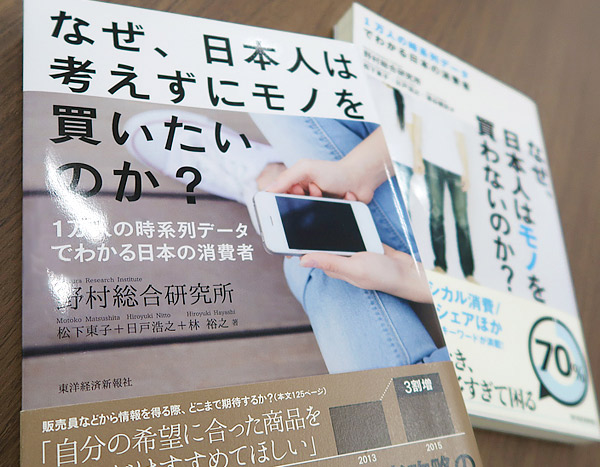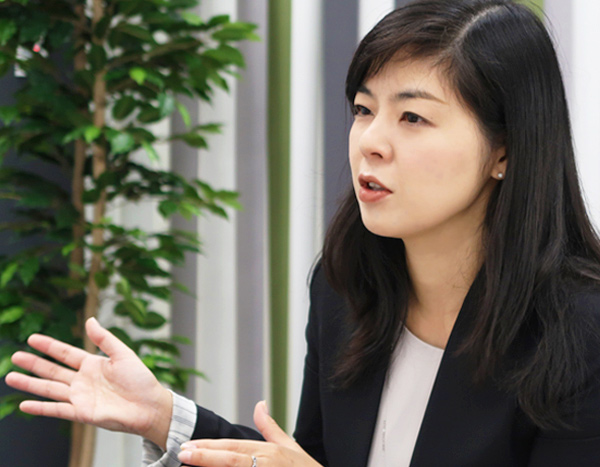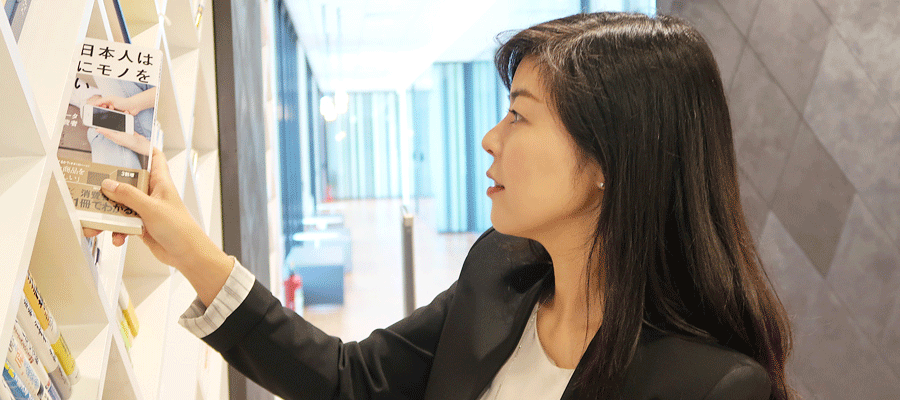
Living up to the expectations of various parties while maintaining a work-life balance; being requested by clients by name for jobs requiring one’s individual expertise while also fulfilling one’s role as a member of a team—this is ideal for a business person. For more than 20 years, Motoko Matsushita has surveyed the ways in which the Japanese social environment and economic conditions in which Japanese people live have an impact on consumer psychology and behavior. As a leader in the field of consumer behavior surveys, Matsushita uses her research daily in corporate marketing strategy formulation and consultation regarding consumer consciousness.
Consistently honing expertise in B2C marketing
I studied psychology at university and was interested in consumer sentiment. Since joining NRI in 1996, I’ve consistently worked in my chosen field of B2C marketing. I left NRI temporarily in 2002 for the birth of my first child and to accompany my husband to the United States, but rejoined the company after returning to Japan in the spring of 2005. Since then, I’ve continued to stand at the front lines in the field while controlling my work hours by utilizing various internal systems.
At present, in addition to the research and consulting work I’ve done up until now, I’m involved in Insight Signal, which is used for measuring advertisement effectiveness. The numbers of more consumer-oriented projects are increasing. Although my department name has changed several times, I’ve been able to increase my expertise in my chosen field, and in this sense I’m extremely fortunate.
My mentality changed after being requested by name for a job
A turning point for me was around 2000. I was unexpectedly requested by name for a job by a foreign content company. With the clear awareness that “this is a job that was given to me,” I interacted with the client, discerned their wishes, and satisfied their needs. When the client was satisfied with the results, they requested my work again. That was my first experience of being aware of all those aspects as directly relevant to me.
Being involved in building the “Questionnaire Survey of 10,000 Consumers” in the Social Environment Research Department, to which I belonged when I first joined the company, was also a major event for me. The survey is an attempt to comprehensively investigate lifestyle values, work values, role division by gender, parent-child relationships, spousal relationships, consumer sentiment and draw up a microcosm of the Japanese mentality through a large-scale survey following trends in the values of Japanese people over the long term.

We make a preliminary announcement of the insights obtained through analysis of the survey at the “Media Forum” held for news organizations at the end of the year, and we also compile our findings in articles and books, and hold speaking events and respond to interviews from the media, corporations, and executive organizations. We have conducted the survey once every three years since 1997, and I feel that each time its value increases and the attention and response it receives grows.
Multilayered analysis based on the change of consumer’s attitude
Grasping a consumer image from the “Questionnaire Survey of 10,000 Consumers” is also very useful in providing consulting services for various clients. Normally, in research for our clients, we draw up questions designed for the specific field, but looking at the results of that research in combination with the background changes in consumer behavior enables multilayered and multidimensional analysis that can’t be achieved by looking at those results alone.
For example, if our research shows that “recommendations from shop employees are effective,” looking at that industry alone all we can do is confirm the fact that “the degree of reference to recommendations has risen.” But behind that might be the fact that consumers are increasingly tired of making choices amidst a flood of information and want to make selections simply using their smartphones. If we have a grasp of such trends, it is easier to consider what direction society will go in response to those changes and what the companies must do to address the changing society. A multilayered approach allows us to make proposals with foresight.
Becoming “a professional consumer” while gaining greater expert knowledge

B2C marketing consultants must become “professional consumers” while grasping a strong foundation in analysis tools, measurement methods, survey methods, and trends. I maintain a constant awareness of this in my daily life. When I go to a store, I ask myself why products are displayed a certain way and what trends are being reflected. On the train on the way to work, I observe how passengers use their commuting time and the methods by which companies communicate, and later review the things I noticed with the data I have on hand. In this way, I believe that data, logic, and experience form a single trinity.
No matter how long or how hard we work on a job, our effort is for naught if we can’t satisfy our client’s needs. In order to understand what our clients really want and what we must do to realize their wishes, we must observe our clients carefully, engage in dialogue with them, build a logic from the information we obtain, and turn it into output. To gain this ability, I read as widely and broadly as possible. I also actively take on jobs that require writing papers and articles, giving presentations, and responding to interviews. These activities serve as practice for combining information and drawing conclusions.
I want to follow a one path in life as someone who can be relied upon
One of the joys of working as a consultant is that there are always new discoveries and gratification. My greatest motivation is when a client becomes happy with my work and requests that I work for them again. I also feel fulfilled when I’m told “you know our company better than our own employees” or “I always look forward to having a meeting with you,” when a copy or packaging I and clients created together is used for an actual product, and when a sales forecast model or simulation result I proposed is reflected in a client’s strategy or used in PDCA.
Of course, work doesn’t always go well. But rather than wasting my time worrying about it, I make note of things that went wrong, use that experience to think of a solution, and work hard to make up for lost ground. It’s better to bring things to a positive finish with the awareness that our failures allowed us to reach a superior conclusion. In fact, I often feel, both at work and at home, that there’s not enough time to do everything perfectly, and I sometimes wish I have 36 hours in a day. But I do my best to enjoy work and home life with a positive attitude while making use of every spare moment.
Albert Einstein said, “It’s not that I’m so smart, it’s just that I stay with problems longer.” Continuing to search for a solution without giving up leads to success and discovery. That is why even as I grow in age and experience, rather than taking it easy, I always want to be working in the field with clients, being constantly stimulated. I want to pursue a one path throughout my life as a dedicated professional, so that people can say, “when it comes to this field, Ms. Matsushita is the one to ask.”

Profile
-
Motoko MatsushitaPortraits of Motoko Matsushita
Marketing Strategy Consulting Department
Motoko Matsushita joined Nomura Research Institute in 1996. Throughout her career she has researched consumer behavior and engaged in consulting relating to corporate marketing strategy development and formulation support, brand strategy formulation, demand forecasting, and values and consumer mentality. She has been involved in the “Questionnaire Survey of 10,000 Consumers,” a survey that empirically analyzes and presents Japanese consumer mentality and behavior, since its start in 1997. Her publications include “Naze, nihonjin wa kangaezu ni mono wo kaitai no ka? (Why do Japanese people want to buy goods without thinking?)” (Toyo Keizai Inc.).
* Organization names and job titles may differ from the current version.